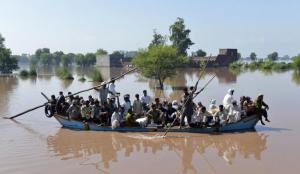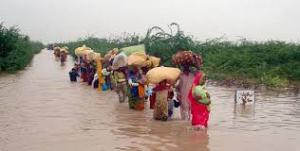Disables Caught in 2014 Floods Havoc, Ignored—Indicates DESPO Post-disaster Situation Report.
The first DESPO report indicates major flaws in post-disaster policy frameworks, especially, lack of provisional protocols for the marginalized disables.
Three hardest-hit segments of the disasters' affectees, that require special protocols in emergency situations, are often neglected and sidelined in strategic progressions: the displaced children, the pregnant women and the disable populations caught in the havoc situation, establishes the UNESCO-SAIRI conjoint report titled DESPO Situation Report of 2014-floods.
The disables, hit by the flood’s havoc, who have been displaced from their local vicinities, should be compassionately dealt with, and must be taken sympathetic care of.
For disables, on account of already being marginalized segments of the society, considerated measures must be ensured, stresses the first Post-Disaster’s Epidemiological Susceptibility & Pandemic Outbreak (DESPO)Assessment report by SAIRI’s principal investigator, Prof. Qadhi Aurangzeb Al Hafi.
Special attention and considerate alertness must be paid to target the displaced children and the pregnant women, which if not demonstrated aptly, could lead towards grimly severe and far-reaching consequences, cautions the floods-2014’s first DESPO situation report.
DESPO P.I., Prof Dr Aurangzeb Hafi, who had also served as the chief epidemiologist and prime investigatory research-analyst in Asian Tsunami 2004, and maintained technical liaisons with UN, its agencies and other local and international sectors of relevance, is now associated with several institutions in capacity of postdoc principal investigator, including SAARC-DUHS Hydro-toxicology chair and the UNESCO chair of watershed management at PU, which has joined the SAIRI’s DESPO project in a principal research-partnership. Prof. Hafi has also headed multiple disabilities risk-factors assessment and disability prevention projects in Sri Lanka and different parts of the world, especially in cataclysmic situations.
Despite the fact that in the aftermaths of raging floods-2014, that arose to break the records of several decades in reference to the Indo-Pak floods history, several coordinated efforts to rescue the losses continue to be on their persistent path, with technical inputs from international and local institutional platforms, including UN, UNICEF, WHO, UNHCR, UNESCO and several other agencies. However, as at each and every time, Prof. Hafi’s voice came forth for echoing the voice for disables.
Strategies must be devised to face the imminent consequential inevitabilities with a particular focus on the marginalized groups, that are often neglected in conventional models of disaster management, says DESPO situation report of 2014 floods.
The first Post-DESPO report that entails the technical aspects of the aftermath consequences of the raging floods pandemic proneness, contagion predispositions and epidemiological vulnerabilities, puts ‘high-spot’ emphasis and necessitating focus on the analysis of water acclimatization and its septicity, after the pestilential contaminated fusions espoused through assimilation of flood water amalgamation with contagion remnants of flood ruined crops, soil, along with other mephitic remnants.
The Post-DESPO report has also identified major indicators of pandemic outbreaks and multiple epidemiological proneness, encircling the topics like diarrheal diseases offshoots directly linked to cell mediated immunity (CMI), mal-nutrition and mal-absorption.
Impaired absorption of water, electrolytes and minerals, which is often likely to be occurred in such disasters, causes impaired formation of Micelle + C complex, which in turn results in multiple mal-absorption, a complex mechanical abnormality. The presence of either both types of deficiencies, or any one of the above mentioned factors can seriously affect the C.M.I. (cell mediated immunity) leading to pathological complications in small babies, specially in those below one year.
"Despite the footages that continuously portray the ‘adequate provisions’ of temporary shelters and tents, however, after nearly one month is going to pass, still there are areas struck by the raging floods, where no temporary shelters on tents have been provided", comments the report.
Nonetheless the file-works show the ‘prompt provisions’ of tents, there remains a considerable number of families, especially the children, the older persons, and the pregnant women, who live in open air, along the road-sides—predisposed to consequential vulnerabilities, indicatingly points out the first Post-DESPO report. Refugees camps or other provisional settlements are the measures that should be taken promptly, and are among the ‘must to be prioritized’ during the first phase of emergency response, mentions further the DESPO report.
Most of the conventional situation reports and strategic plans on floods cover many technical aspects but essentially lack the integration. DESPO parameters devised by SAIRI, however, follow the holistic approach and are explicitly designed to cover a wide range of topics-from pandemic proneness and contagion predispositions to epidemiological vulnerabilities drivers, and is therefore an important advance in disaster management policy frame-working.
DESPO report has been prepared by a monitoring cell established by the UN Dag Hammarskjold Committee, for liaisoning networks to UN agencies and the local bodies of disaster management. DESPO assessment report is aimed to identify the technical facets that have been neglected during the emergency response, and are must to be prioritized in the rehabilitation phase. The UNHCR, UNICR, WHO, UNICEF and UNESCO and the local governments are amongst the principal stakeholders of the SAIRI's DESPO indicators.
SAIRI holds an adept consummate expertise in Pre-DESPO as well as Post-DESPO phases. The Post-DESPO assessment report has been prepared by SAIRI’ research collaboration with the UNESCO chair for watershed management, at PU.
The hard-hit areas, that do call for a special attention in second phase of disaster response include Muzaffargarh, Srinagar, Jhang, Chiniot, Multan, and Pindi Bhattian.
Dr. F.M. Bhatti
SAIRI Research Initiative, Pakistan.
0092-3066630993
email us here
Legal Disclaimer:
EIN Presswire provides this news content "as is" without warranty of any kind. We do not accept any responsibility or liability for the accuracy, content, images, videos, licenses, completeness, legality, or reliability of the information contained in this article. If you have any complaints or copyright issues related to this article, kindly contact the author above.



